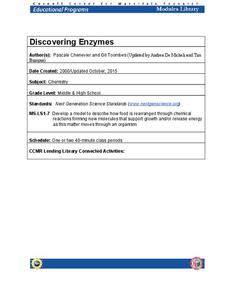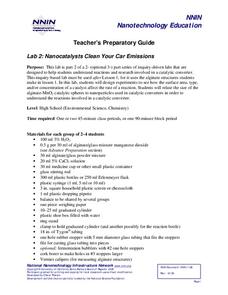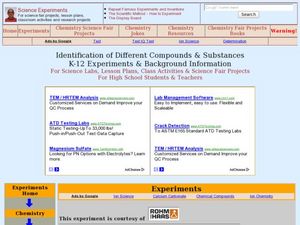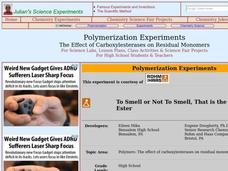Cornell University
Discovering Enzymes
Explore the function of enzymes through a series of lab investigations. Learners use household enzymes such as hydrogen peroxide to model the role of enzymes. The enzymes break down proteins with and without a catalyst.
National Nanotechnology Infrastructure Network
Lab 2: Nanocatalysts Clean Your Car Emissions
Surface area certainly surfaces as a variable for chemical reaction rates. Scholars perform an experiment to discover how the size of catalysts affect the rate of a chemical reaction. They record their results in tables and graphs to...
National Institute of Open Schooling
Adsorption and Catalysis
Adsorption, not absorption, is when atoms stick to the surface of an object, like water sticking to a grain of sand. An informative lesson delves into adsorption, teaching physical and chemisorption and the factors that affect them....
Curated OER
Chemistry Midterm Topic Review
In this chemistry review worksheet, students answer and solve 95 questions about chemical reactions, hydrocarbons, functional groups, moles, acids and bases and solutions.
Curated OER
Chemistry of Food
For this chemistry of food worksheet, students complete 20 various types of questions related to food and nutrition. First, they complete a crossword puzzle with vocabulary terms. Then, students use the figure shown to write the...
Beyond Benign
Exothermic and Endothermic Reactions
How can you tell the difference between endothermic and exothermic reactions? Chemistry scholars perform and observe two chemical reactions, measure the temperature throughout, then draw conclusions about changes in energy from their...
Curated OER
Activity #19 Oxygen For Yeast
Students observe and record what occurs when yeast is added to hydrogen peroxide. They indicate why a chemical reaction (decompostion) must have occurred during the experiement. Pupils explain why yeast was used. Students comprehend the...
Curated OER
Activity #6 How Fast Do Reactions Go?
Students name the factors (concentration, temperature, and a catalyst) which can affect the rate of a chemical reaction. They use their knowledge of particle theory to explain their observations. Pupils comprehend that the...
Curated OER
Identification of Different Compounds and Substances
Students conduct a series of tests to identify unknown compounds. In this chemistry lesson plan, students compare the physical and chemical properties of substances. They collect data and formulate a conclusion.
Curated OER
Chemiluminescence
Students explore chemiluminescence through various experiments. For this chemistry lesson, students explain the chemical reaction that drives the process. They give real life applications of chemiluminescence.
Curated OER
BioFuels: The Chemistry and Economics of Alternative Fuels
Junior chemists manufacture biodiesel in the lab. For this exercise, they check the purity of the biodiesel using thin layer chromatography. They also calculate its density and heat of combustion. They are sure to rise to the...
Curated OER
Reaction Mechanisms
In this reactions worksheet, students give the equation for the overall reaction, identifying the catalyst in the equation. Students create graphs and write out the rate determining step. This worksheet has 4 graphs, 2 short answers, and...
Curated OER
Reaction Rate
In this reactions worksheet, students determine which reaction with occur most quickly and explain how a catalyst works. This worksheet has 4 short answer questions.
Curated OER
Equilibrium Practice
In this chemical reactions worksheet, students determine solubility product expressions, equilibrium constants, and equilibrium concentrations. This worksheet has 15 multiple choice questions and 3 problems to solve.
Curated OER
The Rates of Chemical Reactions
In this chemistry worksheet, students select answers to 8 multiple choice questions from the drop down box. They identify the factors affecting rates of chemical reactions.
Curated OER
Catalase and Catalysis
Students explore enzyme catalysis through a series of experiments. In this chemistry activity, students determine the factors affecting catalysis. They explain the different uses of this process.
Curated OER
Lab: Percent of Composition of KClO3
Students find the percent of oxygen in potassium chlorate. In this percent composition lesson plan, students heat a solution of potassium chlorate using a catalyst, manganese dioxide, to decompose the potassium chlorate and release...
Curated OER
Quiz 2-Chemistry Reaction Rates
For this rate of reactions quiz, students solve three problems related to chemical reactions and their rates including rates of decay and rate constants.
Virginia Department of Education
Predicting Products and Writing Equations
A chemistry lesson presents 14 chemical reactions for scholars to observe, write the equation, and balance the equations. Additionally, it provides ways to extend the activity as it relates to catalysts.
Curated OER
Polymerization Experiments
High schoolers explain the process of polymerization. For this chemistry lesson, students produce carboxylesterase in the lab. They test its effectiveness in removing the by-product odor.
Curated OER
Kinetics Review Sheet
In this kinetics worksheet, students define 7 terms related to the energy of reactions, they find the average reaction rate in a reaction, they sketch an energy diagram for an endothermic reaction and they compare exothermic and...
Science Geek
Reaction Kinetics
Show your classes the science behind rates of reactions with a presentation that explains factors that affect the rate, activation energies, exothermic and endothermic processes, and the proportionality of the product and reactant...
Curated OER
Describing Chemical Reactions
In this chemical reactions instructional activity, students fill in 12 blanks with the appropriate terms related to chemical reactions. They also indicate if 4 statements are true or false and match 7 words with their descriptions....
Curated OER
Writing Complete Equations Worksheet
In this chemistry learning exercise, students write in the correct equations in accordance to solving the word problems. The answers are on page 2.























